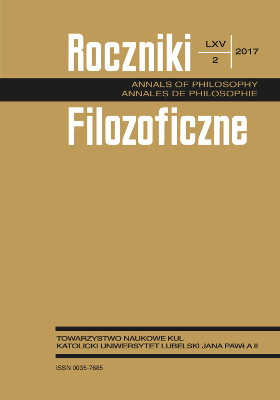Scholastic Sources of Gottfried Wilhelm Leibniz’s Treatise Disputatio metaphysica de principio individui
Scholastic Sources of Gottfried Wilhelm Leibniz’s Treatise Disputatio metaphysica de principio individui
Author(s): Martyna KoszkałoSubject(s): Philosophy, History of Philosophy, Early Modern Philosophy
Published by: Towarzystwo Naukowe KUL & Katolicki Uniwersytet Lubelski Jana Pawła II
Keywords: principle of individuation; individual; double negation; existence; haecceitas; total (whole) entity; metaphysical pluralism; metaphysical individualism; Leibniz; John Duns Scotus; Henry of Ghent; Suá
Summary/Abstract: The object of this article is the scholastic inspirations found in the metaphysical disputation De principio individui by Gottfried Wilhelm Leibniz. The purpose of this study was, on one hand, a reconstruction of Leibniz’s theory concerning the principle of individuation, and on the other hand, a presentation of some texts by medieval scholastic authors (Henry of Ghent, Peter of Falco, Thomas Aquinas, Aegidius of Rome, Robert Kilwardby, William of Ockham) to whose ideas Leibniz refers in the named work, even though he had, for the most part, only second-hand information concerning them. In his juvenile treatise, Leibniz states that the individuating principle has to be universal, which means relevant to all kinds of being; it has to be metaphysical in character and not merely epistemological. He regards individuality as synonymous with unity combined with difference. He resolutely takes sides with nominalism and rejects the reality of all kinds of universal beings and beings whose unity is weaker than numerical unity. As a consequence of this assumption, he rejects the conceptions in which the principle of individuation is formed by: double negation, existence or the haecceity. By contrast, he embraces the solution (close to the tradition originated by Ockham and also related to Suárez), according to which the whole entity (tota entitas) of an individual thing is the principle of individuation. In effect, for Leibniz, any real thing is simply singular, which comes down to the thesis that a thing is singular owing to its own metaphysical subcomponents, which are singular by themselves.
Journal: Roczniki Filozoficzne
- Issue Year: 65/2017
- Issue No: 2
- Page Range: 23-55
- Page Count: 33
- Language: English

